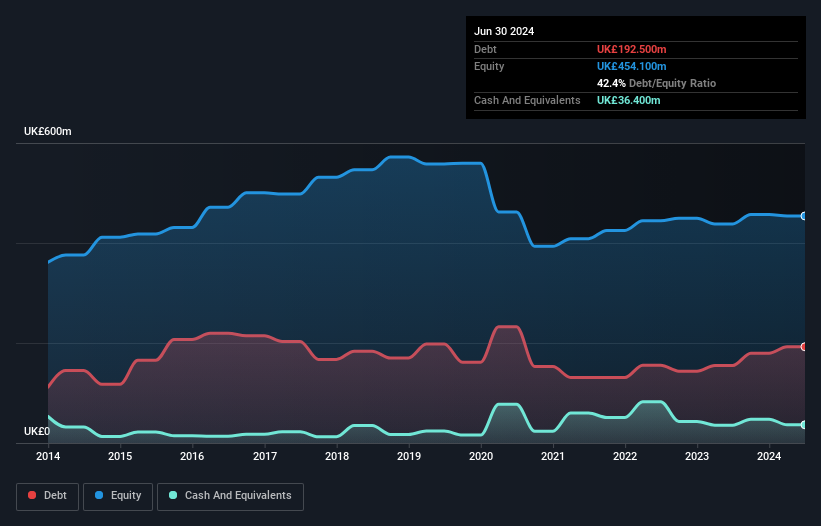
Warren Buffett famously said, 'Volatility is far from synonymous with risk.' So it might be obvious that you need to consider debt, when you think about how risky any given stock is, because too much debt can sink a company. Importantly, Senior plc (LON:SNR) does carry debt. But should shareholders be worried about its use of debt?
When Is Debt A Problem?
Debt and other liabilities become risky for a business when it cannot easily fulfill those obligations, either with free cash flow or by raising capital at an attractive price. Part and parcel of capitalism is the process of 'creative destruction' where failed businesses are mercilessly liquidated by their bankers. While that is not too common, we often do see indebted companies permanently diluting shareholders because lenders force them to raise capital at a distressed price. Of course, debt can be an important tool in businesses, particularly capital heavy businesses. When we examine debt levels, we first consider both cash and debt levels, together.
View our latest analysis for Senior
How Much Debt Does Senior Carry?
The image below, which you can click on for greater detail, shows that at June 2024 Senior had debt of UK£192.5m, up from UK£155.1m in one year. However, it does have UK£36.4m in cash offsetting this, leading to net debt of about UK£156.1m.

How Healthy Is Senior's Balance Sheet?
According to the last reported balance sheet, Senior had liabilities of UK£260.3m due within 12 months, and liabilities of UK£276.4m due beyond 12 months. On the other hand, it had cash of UK£36.4m and UK£147.0m worth of receivables due within a year. So its liabilities total UK£353.3m more than the combination of its cash and short-term receivables.
This deficit is considerable relative to its market capitalization of UK£522.7m, so it does suggest shareholders should keep an eye on Senior's use of debt. Should its lenders demand that it shore up the balance sheet, shareholders would likely face severe dilution.
We use two main ratios to inform us about debt levels relative to earnings. The first is net debt divided by earnings before interest, tax, depreciation, and amortization (EBITDA), while the second is how many times its earnings before interest and tax (EBIT) covers its interest expense (or its interest cover, for short). This way, we consider both the absolute quantum of the debt, as well as the interest rates paid on it.
Senior has net debt worth 1.9 times EBITDA, which isn't too much, but its interest cover looks a bit on the low side, with EBIT at only 3.1 times the interest expense. While that doesn't worry us too much, it does suggest the interest payments are somewhat of a burden. If Senior can keep growing EBIT at last year's rate of 17% over the last year, then it will find its debt load easier to manage. The balance sheet is clearly the area to focus on when you are analysing debt. But ultimately the future profitability of the business will decide if Senior can strengthen its balance sheet over time. So if you're focused on the future you can check out this free report showing analyst profit forecasts.
Finally, while the tax-man may adore accounting profits, lenders only accept cold hard cash. So we clearly need to look at whether that EBIT is leading to corresponding free cash flow. Looking at the most recent three years, Senior recorded free cash flow of 27% of its EBIT, which is weaker than we'd expect. That weak cash conversion makes it more difficult to handle indebtedness.
Our View
Senior's interest cover and level of total liabilities definitely weigh on it, in our esteem. But we do take some comfort from its EBIT growth rate. Taking the abovementioned factors together we do think Senior's debt poses some risks to the business. So while that leverage does boost returns on equity, we wouldn't really want to see it increase from here. In light of our reservations about the company's balance sheet, it seems sensible to check if insiders have been selling shares recently.
If you're interested in investing in businesses that can grow profits without the burden of debt, then check out this free list of growing businesses that have net cash on the balance sheet.
New: Manage All Your Stock Portfolios in One Place
We've created the ultimate portfolio companion for stock investors, and it's free.
• Connect an unlimited number of Portfolios and see your total in one currency
• Be alerted to new Warning Signs or Risks via email or mobile
• Track the Fair Value of your stocks
Have feedback on this article? Concerned about the content? Get in touch with us directly. Alternatively, email editorial-team (at) simplywallst.com.
This article by Simply Wall St is general in nature. We provide commentary based on historical data and analyst forecasts only using an unbiased methodology and our articles are not intended to be financial advice. It does not constitute a recommendation to buy or sell any stock, and does not take account of your objectives, or your financial situation. We aim to bring you long-term focused analysis driven by fundamental data. Note that our analysis may not factor in the latest price-sensitive company announcements or qualitative material. Simply Wall St has no position in any stocks mentioned.
About LSE:SNR
Senior
Designs, manufactures, and sells high-technology components and systems for the original equipment manufacturers in the aerospace, defense, land vehicle, and power and energy markets in North America, the United Kingdom, South Africa, India, China, and internationally.
Good value with adequate balance sheet.
Similar Companies
Market Insights
Community Narratives




